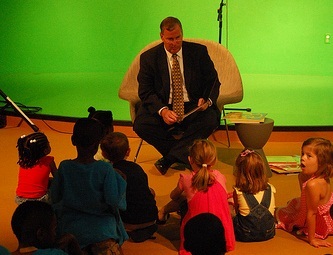Teacher Jenny Jackaway knows firsthand that parent involvement can transform learning. She has built a nonprofit called Pages and Chapters around this concept. It provides families reading advice and tutoring, and it requires parent or caregiver attendance at the literacy sessions she runs through local schools and libraries.
The organization’s structured literacy program, Open Books, involves families and volunteers in a series of once-weekly sessions for kids in grades K-5. The grassroots effort began in the homes of Jackaway’s students in Missouri.
“I would get phone calls from my parents on a very regular basis, not knowing how to do their kids’ homework or how to help them,” Jackaway said.
Teaching literacy can be difficult for parents, who may be well-educated but not know the foundation points of reading, Jackaway said.
Jackaway offered to tutor students after school, but transportation and scheduling conflicts arose immediately.
“Sometimes the families we work with are really struggling to put food on the table, and sometimes they just don’t have the full resources at their disposal to work on things [with their child],” Jackaway said. “So I said, ‘I’ll come to you.'”
Parent Empowerment Key
Jackaway found offering parents appropriate tools in the home was far more effective than teacher-student tutoring sessions.
“Once you involve the parents, a few things happen,” she said. “The parents are more informed about what they can do, [whether it’s] phonics flash cards, reading a book with their child and stopping to ask vocabulary and comprehension questions, increasing vocabulary usage throughout the day. It helps foster student-parent relationships, and I’ve seen more results bringing parents in.”
In year two of her efforts, Jackaway tutored for two or three families, “meeting them at McDonald’s, the library, wherever,” she said. “One was homeless. I didn’t think I could keep doing it. I loved it, but it wasn’t practical.”
So she turned her hobby into a nonprofit, which opened in 2012.
Families Appreciative
“It did give me an opportunity to look at what [my daughter’s] reading patterns really were,” said Felechia Vineyard. Jackaway tutored Vineyard’s daughter, Epiphany. “It made me aware of what I could help her do at home, things she may have been struggling with at school. It was a little bit of an eye-opener.”
The library-based program increased Epiphany’s joy in reading and turned her into a voracious reader, Vineyard said.
Many of OpenBooks’ volunteer tutors are teachers. Chelsea Mossman had just started teaching in Kansas City when she met Jackaway.
“I can use what I’ve been using in my classroom but individualize it for one student,” Mossman said. “Being in an inner-city district, I know the struggles that come with parents not knowing how to teach their kids. Page and Chapters brings them all together. It’s only an hour a week, but… I could see growth in just three or four weeks.”
Strengthening Relationships
This year Mossman worked one on one with a child and his grandfather, who had a strained relationship at the start of the session, she said.
“One of the most important things we worked on was praise,” she said. “That transformed the student and their relationship; his confidence needed to be up.”
Connie Campbell, who has a PhD in reading, advises Jackaway’s nonprofit.
“I really valued [Jackaway’s] empowerment of people,… not to fix a child but to increase the learning capacity within the home and empower parents,” Campbell said. “I’ve worked with literally thousands of teachers, and no one has impressed me as much as Jenny.”
Examining Success
In the spring of 2013, Pages and Chapters partnered with Mill Creek Upper Elementary in Belton, Missouri to measure the effectiveness of the Open Books program, using a control group and experimental group.
Campbell used students’ classroom assignments to assess their reading ability. She also surveyed families before and after they participated.
The top areas of increased improvement, as identified by parents and students, were parents’ attitudes toward reading, which increased 14 percent; reading for pleasure increased 18 percent; and the enjoyment of discussing books improved 26 percent.
The program also tests students so parents can pinpoint where their child is struggling.
Finding Funds
Fundraisers, grants, individual donors, and local businesses all contribute to the organization.
Campbell designed evaluation tools to give the organization data to obtain grants and grow. Pages and Chapters won its first grant from the Junior League of Kansas City this year.
Jan Finn reviewed the Pages and Chapters grant application for the Junior League. Promoting volunteerism and community improvement were just part of the appeal, Finn said.
“Pages and Chapters began with a small group of committed teachers who saw a need to teach children to read, without any source of funding,” Finn said.
Moving On Up
Two summers and one full school year later, Pages and Chapters’ Open Books program is beginning to outgrow its space at the local library. A designer is developing for them an iPhone-based application for parents and children.
“I think Jenny will emerge as a national leader in some matter in the field,” Campbell said. “She could take [Open Books] and create a licensed program which could be marketed across the board.”
The nonprofit capitalizes on an often-missing element in education, especially for needy children: Parents.
“The connection between families, schools, and students is crucial … and definitely missing at a lot of schools,” Mossman said.
Image by Sean Dreilinger.




